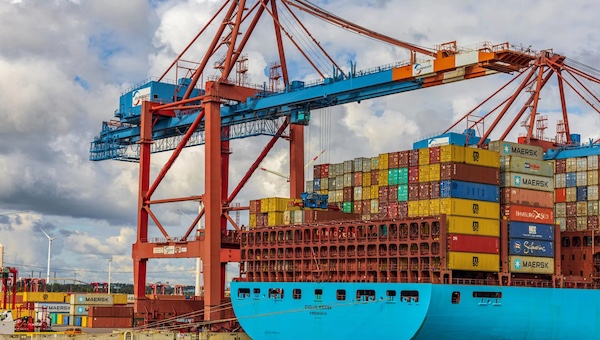
PHOTO BY DOMINIK LÜCKMANN ON UNSPLASH
AUTOMATE THE PORTS
BY: ERIC BOEHMORIGINAL SITE: REASON
The dockworkers' strike is over, but America's ports will be some of the least efficient in the world whether they are open or closed.
The news that the International Longshoreman Association (ILA) agreed to suspend its strike until January is undeniably good news for just about every aspect of America's economy.
But whether they are open or closed, many American ports rank among the least efficient in the entire world. The ports in New York, Baltimore, and Houston— three of the largest of the 36 ports that could have been shut down by the ILA strike—are ranked no higher than 300th place (out of 348 in total) in the World Bank's most recent report on port efficiency . Not a single U.S. port ranks in the top 50. Slow-moving ports act as bottlenecks to commerce both coming and going, which "reduces the competitiveness of the country…and hinders economic growth and poverty reduction," the World Bank notes.
That so many American ports are struggling to keep up with the rest of the world should be unacceptable. Fixing that ought to be one of the top priorities as negotiations between the ports and the ILA resume.
The union's position is, unfortunately, that those inefficiencies aren't just acceptable, but actually desirable.
The ILA's strike had little to do with demands for higher wages—the United States Maritime Alliance (USMX), which operates the ports, had reportedly offered a 50 percent raise to ILA workers, many of whom are already very well compensated . Instead, it seems to be driven mainly by the union's desire to block automation at the ports where its members work.
As econ blogger Noah Smith points out, "port automation is already heavily discouraged, both by the ILA's existing contract, and by Department of Transportation Rules that stipulate that automation is never allowed to reduce the number or quality of jobs. But now the ILA wants to ban automation completely."
"Let me be clear: we don't want any form of semi-automation or full automation," two of the ILA's top executives wrote in a letter to their members last month.
The problem is that American ports need more automation just to catch up with what's considered normal in the rest of the world. For example, automated cranes in use at the port of Rotterdam in the Netherlands since the 1990s are 80 percent faster than the human-operated cranes used at the port in Oakland, California, according to an estimate by one trade publication.
It's worth noting that the lack of automation, and the resulting inefficiencies, at American ports was a major factor in the supply chain issues that popped up during and after the COVID-19 pandemic.
From the union's perspective, of course, more automation means fewer human beings who can be forced into joining the union as a condition of their job. Harold Daggett, president of the ILA, has been very clear that he doesn't care who else gets hurt by the inefficiencies that his union is fighting to preserve—as Reason 's Liz Wolfe covered earlier this week .
He's also complained about things like automated tolling , which is a useful comparison for the fight over automation at the ports. To Daggett, the transition from toll booths to electronic options like E-ZPass has meant that "all those union jobs are gone."
To the rest of the world, that transition meant less time wasted sitting in line to pay a toll, so you get to your destination more quickly. There's no right to a job as a toll taker—and unions exist to protect workers from unsafe working conditions, not from market forces.
Additionally, the tradeoff between automation and jobs is not a zero-sum game. A study published in 2022 found that the partial automation of the Port of Los Angeles had resulted in "significant gains in throughput, productivity, and efficiency, resulting in more hours than ever for workers." As with other forms of automation, some job losses are inevitable, but efficiency gains benefit dockworkers too—and the truckers, manufacturers, and others in the supply chain who are waiting for goods to be loaded or unloaded.
Indeed, if maximizing the number of union jobs at ports was the highest value to society, Daggett and the ILA might want to change their demands. Why not demand a ban on cranes, forklifts, and tractor-trailers too? It would take a lot more workers to unload a freighter if everything had to be lifted by hand, after all.
The absurdity of the ILA's position is perhaps best illustrated by a pair of tweets about the strike that were posted in quick succession by More Perfect Union, a progressive nonprofit news outlet. The first notes that the striking ILA workers were attempting to block "job-killing automation," while the second described the union laborers' work as "backbreaking."
Those workers ought to be saved from their backbreaking labor in much the same way that I'm saved from having to wash the dishes by hand or scrub my clothes on a washboard: by letting robots handle as much of the work as possible.
Conceding to the Luddites makes no sense. As Daggett made clear in the run-up to this week's strike, what happens at America's ports is of vital importance to the rest of the economy as well. Now that the strike is off until at least mid-January and negotiations have restarted, the USMX must avoid agreeing to concessions that will cause America's ports to fall farther behind the rest of the world.
AWFSM CATEGORIES
Activism | AI | Belief | Big Pharma | Conspiracy | Cult | Culture | Deep State | Economy | Education | Entertainment | Environment | Faith | Global | Government | Health | Hi Tech | Leadership | Politics | Prophecy | Science | Security | Social Climate | Universe | War
